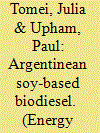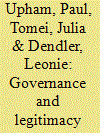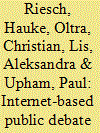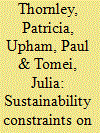|
|
|
Sort Order |
|
|
|
Items / Page
|
|
|
|
|
|
|
| Srl | Item |
| 1 |
ID:
092571


|
|
|
|
|
| Publication |
2009.
|
| Summary/Abstract |
To date, studies of energy siting controversy and of environmental psychology have barely informed one another, despite the environmental-behaviour literature potentially having considerable relevance to understanding public opposition to energy projects. This paper points towards this relevance, using the example of a longitudinal study of public objections to a 21.5 MWe bioenergy gasifier proposed for Winkleigh in Devon, England. Local opinion surveys in 2004 and 2007 showed that public opposition to the proposed gasifier remained strong but also revealed some statistically significant change and correlations of wider interest. In the context of the environmental psychology literature, the dominant model of contextualised values, intention and behaviour, as well as other psychological approaches, are found to be helpful, both for making sense of the results and for informing a psychological research agenda on public objection to new energy infrastructure.
|
|
|
|
|
|
|
|
|
|
|
|
|
|
|
|
| 2 |
ID:
091547


|
|
|
|
|
| Publication |
2009.
|
| Summary/Abstract |
This paper explores the economic, social and environmental context, drivers and impacts of increased demand for Argentine soy-based biodiesel. It is based on extensive stakeholder interviews in Argentina, including those in government, academia and the third sector; as well as participant observation with communities in soy cultivation areas; and review of relevant academic and grey literatures. Given Argentina's history of political instability and relatively weak levels of environmental protection, there is reason to be sceptical of the likely effectiveness of biofuel sustainability certification as applied to Argentine soy. Direct contracts between feedstock producers and biodiesel retailers may be a more reliable approach to minimise adverse environmental and social impacts than certification alone.
|
|
|
|
|
|
|
|
|
|
|
|
|
|
|
|
| 3 |
ID:
126498


|
|
|
|
|
| Publication |
2013.
|
| Summary/Abstract |
A number of recent techno-economic studies have shown that energy storage could offer significant benefits to a low-carbon UK energy system as it faces increased challenges in matching supply and demand. However, the majority of this work has not investigated the real-world issues affecting the widespread deployment of storage. This paper is designed to address this gap by drawing on the systems innovation and socio-technical transitions literature to identify some of the most important contextual factors which are likely to influence storage deployment. Specifically it uses a coevolutionary framework to examine how changes in ecosystems, user practices, business strategies, institutions and technologies are creating a new selection environment and potentially opening up the energy system to new variations of storage for both electricity and heat. The analysis shows how these different dimensions of the energy regime can coevolve in mutually reinforcing ways to create alternative pathways for the energy system which in turn have different flexibility requirements and imply different roles for storage technologies. Using this framework three pathways are developed - user led, decentralised and centralised - which illustrate potential long-term trajectories for energy storage technologies in a low-carbon energy system.
|
|
|
|
|
|
|
|
|
|
|
|
|
|
|
|
| 4 |
ID:
104939


|
|
|
|
|
| Publication |
2011.
|
| Summary/Abstract |
Biofuel policy has become highly contentious in Europe. In this paper we discuss the governance and legitimacy aspects of the carbon and sustainability system of the UK Renewable Transport Fuel Obligation (RTFO), both before and after implementation of the Renewable Energy Directive. RTFO certification is of a meta-type, being built upon existing certification and labelling schemes, each of which are more or less contested by NGOs. Despite the RTFO being based on these non-state initiatives, so far the concerns of environment and development NGOs and others have not been given serious expression in regulatory terms. Indeed, biofuel policy development in the UK has arguably been unduly non-responsive to critical opinion, given the limited scientific base on biofuel impacts and the reliance of RTFO sustainability certification on non-state actors and schemes. Drawing on documentary evidence, interviews and three sets of literatures - co-production of regulation; post-normal science; and legitimacy of non-state certification and labelling processes - we suggest that until concerned voices are given a stronger expression in UK and EC biofuel policy development, the policy cannot yet be said to have achieved a wide social mandate.
|
|
|
|
|
|
|
|
|
|
|
|
|
|
|
|
| 5 |
ID:
121327


|
|
|
|
|
| Publication |
2013.
|
| Summary/Abstract |
This paper makes three contributions to the developing literature on public opinion and understanding of CCS. The first is a discussion of online focus groups as a deliberative method in experimental and perhaps consultative contexts. The second is the role of anchoring and associative reasoning in the development of public opinion of CCS, illustrated through the coincidental timing of the investigation with the Fukushima nuclear accident. The third is a discussion of managing public-facing energy messaging in an age of public access to online information. Two multi-day, online focus groups or "dialogue boards" were held, one in Poland and one in Spain, with participants drawn from regions with active CCS development potential. The nature of the groups led to participants being subject to wider social influence through discussion of the topic off-line. They were also able to research and present evidence on the topic to the group, deepening debate and allowing the emergence of 'experts'. The study illustrates and affirms the importance of trust in message source, the difficulties of challenging pre-existing concerns and opinion and the challenge potentially posed by access to conflicting online information.
|
|
|
|
|
|
|
|
|
|
|
|
|
|
|
|
| 6 |
ID:
092845


|
|
|
|
|
| Publication |
2009.
|
| Summary/Abstract |
Use of bioenergy as a renewable resource is increasing in many parts of the world and can generate significant environmental, economic and social benefits if managed with due regard to sustainability constraints. This work reviews the environmental, social and economic constraints on key feedstocks for UK heat, power and transport fuel. Key sustainability constraints include greenhouse gas savings achieved for different fuels, land availability, air quality impacts and facility siting. Applying those constraints, we estimate that existing technologies would facilitate a sustainability constrained level of medium-term bioenergy/biofuel supply to the UK of 4.9% of total energy demand, broken down into 4.3% of heat demands, 4.3% of electricity, and 5.8% of transport fuel. This suggests that attempts to increase the supply above these levels could have counterproductive sustainability impacts in the absence of compensating technology developments or identification of additional resources. The barriers that currently prevent this level of supply being achieved have been analysed and classified. This suggests that the biggest policy impacts would be in stimulating the market for heat demand in rural areas, supporting feedstock prices in a manner that incentivised efficient use/maximum
|
|
|
|
|
|
|
|
|
|
|
|
|
|
|
|
| 7 |
ID:
177318


|
|
|
|
|
| Summary/Abstract |
This paper aims to fill a research gap in the area of consumer-citizen attitudes to business models for decentralized energy storage, at the level of households and buildings. The study focuses on the interaction of such attitudes and their underlying motivation factors with socio-cultural, contextual factors. Self-determination theory (SDT) is used as a theoretical framework, to connect interpersonal and contextual factors, addressing the question of how contexts influence the motivation to support energy storage. Drawing on SDT, this study examines the role of autarky (independence from the energy system), autonomy (control over energy management) and relatedness (degree of sharing required) in this regard, embedded and interpreted in the socio-cultural local context of two demonstration sites in Sweden and Portugal. A mixed method approach is used. Quantitative survey data provides information on local social and cultural dimensions, followed by stakeholder consultation workshops that elicit participants’ views on different models of decentralized energy storage. The findings raise questions of how to improve autarky and autonomy for prosumers, while keeping the need for time investment low and provide flexibility regarding the required degree of interaction between prosumers. Implications for business models and policy support for citizen-centered sustainable urban energy systems are derived.
|
|
|
|
|
|
|
|
|
|
|
|
|
|
|
|
|
|
|
|
|